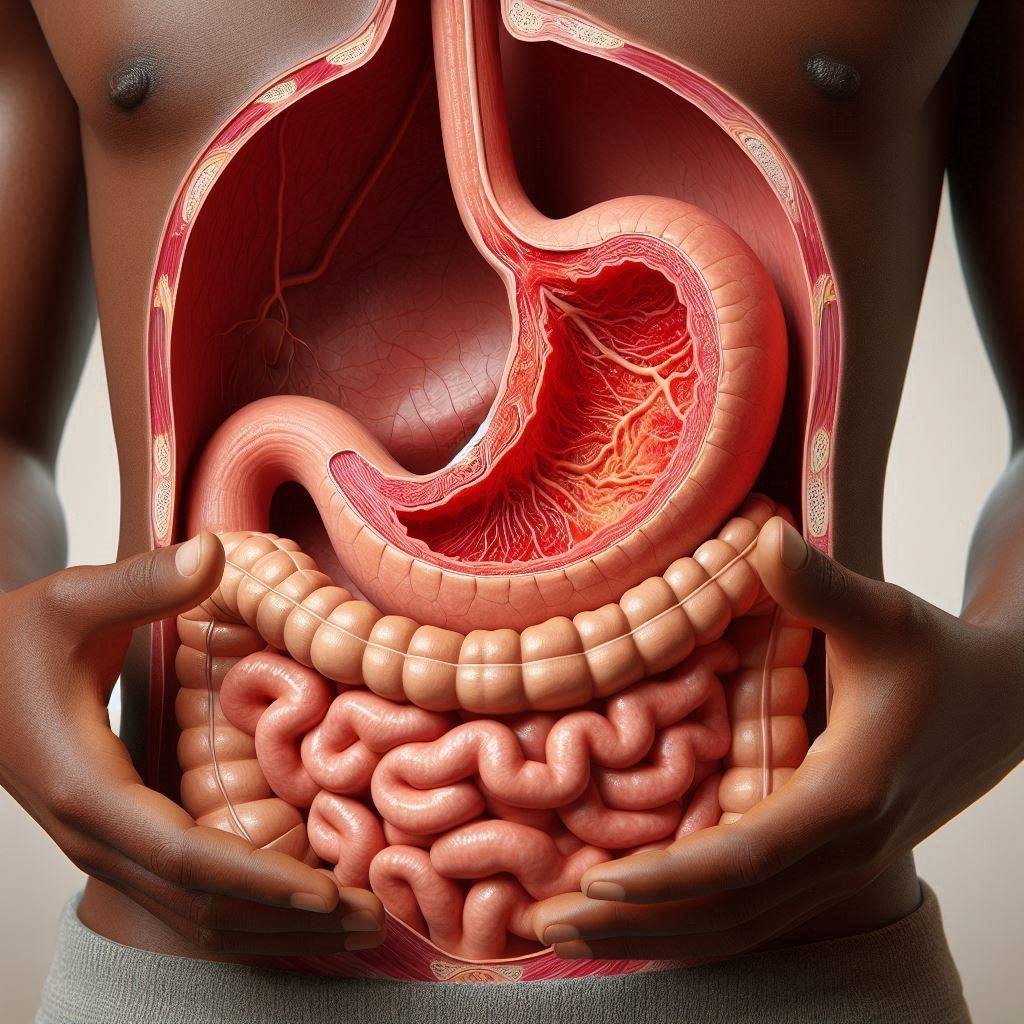Discover the signs, symptoms, and effective treatments for stomach ulcers. Learn about causes, prevention, and when to seek medical help for this common condition.
Quick Summary
A stomach ulcer is an open sore in the lining of your stomach. Key points:
- Common symptoms: Burning, pain, bloating, nausea
- Major causes: H. pylori bacteria, NSAIDs, stress
- Diagnosis: Endoscopy, breath test, blood test
- Treatment: Antibiotics, acid reducers, lifestyle changes
- Prevention: Healthy diet, stress management, limited NSAID use
If you experience persistent stomach pain or black stools, seek medical attention immediately.
What is a Stomach Ulcer?

A Peptic ulcer, or gastric ulcer, is a painful lesion that forms on the lining of the stomach. These ulcers occur when the thick layer of mucus protecting your stomach from digestive juices is reduced, allowing the acidic digestive juices to eat away at the lining tissues of the stomach.
As a gastroenterologist with over 15 years of experience, I’ve treated countless patients with stomach ulcers. I’ve seen firsthand how debilitating this condition can be, but also how treatable it is with the right approach.
Types of Stomach Ulcers
There are two main types of Gastric ulcers:
- Gastric ulcers: These occur in the stomach lining.
- Duodenal ulcers: These form in the upper section of the small intestine, known as the duodenum.
Signs and Symptoms of Stomach Ulcers
Recognizing the signs and symptoms of Gastric ulcers is crucial for early diagnosis and treatment. Here are the most common symptoms I’ve observed in my patients:
- Burning stomach pain
- The feeling of fullness, bloating, or belching
- Intolerance to fatty foods
- Heartburn
- Nausea
It’s essential to recognize that some individuals with stomach ulcers might not show any symptoms. In my practice, I’ve seen cases where ulcers were discovered during routine check-ups or while investigating other issues.
When to Seek Medical Help
If you experience any of the following symptoms, seek immediate medical attention:
- Severe stomach pain
- Bloody or black tarry stools
- Vomiting blood or vomit that resembles coffee grounds
- Unexplained weight loss
- Appetite changes
Causes of Stomach Ulcers
Understanding the causes of Gastric ulcers is essential for both prevention and treatment. In my years of practice, I’ve found that the two most common causes are:
- Helicobacter pylori (H. pylori) bacterial infection
- Prolonged use of nonsteroidal anti-inflammatory drugs (NSAIDs)
Helicobacter pylori (H. pylori) infection
- Helicobacter pylori is a type of bacteria that can enter your body and live in your digestive tract. Over time, it can cause sores or ulcers in your stomach or small intestine.
I’ve seen a significant number of patients who developed stomach ulcers because of H. pylori infection. Research suggests that about 50% of people worldwide are infected with H. pylori, although not everyone develops ulcers.
NSAIDs and Stomach Ulcers
Nonsteroidal anti-inflammatory drugs (NSAIDs) such as aspirin, ibuprofen, and naproxen can cause irritation or inflammation in the lining of the stomach and small intestine, resulting in ulcers.
In my practice, I’ve treated many patients who developed stomach ulcers after long-term or high-dose use of NSAIDs. It’s crucial to use these medications as directed and consult with your doctor about alternatives if you’re at high risk for ulcers.
Other Risk Factors
While H. pylori and NSAIDs are the primary causes, other factors can increase your risk of developing a stomach ulcer:
- Excessive alcohol consumption
- Smoking
- Stress
- Genetics
- Other medical conditions (e.g., Zollinger-Ellison syndrome)
Diagnosis of Stomach Ulcers
Accurate diagnosis is crucial for effective treatment of Gastric ulcers. In my practice, I use several methods to diagnose ulcers:
- Medical history and physical exam
- Upper endoscopy
- Upper GI series
- H. pylori tests (breath test, blood test, or stool test)
Upper Endoscopy
An upper endoscopy is the gold standard for diagnosing Gastric ulcers. During this procedure, I use a thin, flexible tube with a camera to examine the lining of the esophagus, stomach, and upper small intestine.
I always explain to my patients that while an endoscopy might sound intimidating, it’s a relatively quick and painless procedure that provides valuable information for diagnosis and treatment.
Treatment Options for Stomach Ulcers
Treating Digestive ulcers effectively requires a multifaceted approach. Based on my experience, here are the most common and effective treatments:
- Antibiotics (for H. pylori infection)
- Proton pump inhibitors (PPIs)
- H2 blockers
- Antacids
- Cytoprotective agents
- Lifestyle changes
Antibiotics for H. pylori
If H. pylori is detected, I typically prescribe a combination of antibiotics. The most common regimen I use is:
- Clarithromycin
- Amoxicillin
- Metronidazole (as an alternative to amoxicillin for penicillin-allergic patients)
Acid-Reducing Medications
Proton pump inhibitors (PPIs) and H2 blockers are crucial in reducing stomach acid and promoting healing. Some common options include:
- PPIs: Omeprazole, Esomeprazole, Lansoprazole
- H2 blockers: Famotidine, Cimetidine
Lifestyle Changes
Besides medication, I always emphasize the importance of lifestyle changes to my patients with stomach ulcers. These include:
- Quitting smoking
- Limiting alcohol consumption
- Managing stress
- Eating a balanced diet
- Avoiding trigger foods
Prevention of Stomach Ulcers
Preventing Stomach lesions is often easier than treating them. Here are some key preventive measures I recommend to my patients:
- Practice good hygiene to prevent H. pylori infection
- Use NSAIDs responsibly
- Manage stress through relaxation techniques or therapy
- Eat a diet rich in fruits, vegetables, and probiotics
- Avoid smoking and excessive alcohol consumption
Diet for Stomach Ulcers
A proper diet can significantly aid in the healing of Stomach lesions and prevent future occurrences. Based on my experience and the latest research, here are some dietary recommendations:
Foods to Eat:
- Fruits (except citrus)
- Vegetables
- Lean meats
- Fish
- Whole grains
- Probiotics (yogurt, kefir, sauerkraut)
Foods to Avoid:
- Spicy foods
- Citrus fruits and juices
- Alcohol
- Coffee and caffeinated beverages
- Chocolate
- Fatty foods
I always remind my patients that everyone’s triggers may be different, so it’s important to pay attention to how your body reacts to original foods.
Frequently Asked Questions
Do stomach ulcers go away?
Yes, it can go away with proper treatment. Most ulcers heal within 4-8 weeks with appropriate medication and lifestyle changes. However, it’s crucial to complete the full course of treatment, even if symptoms improve, to ensure complete healing and prevent recurrence.
How to cure an ulcer in the stomach fast?
While there’s no instant cure for stomach ulcers, you can speed up the healing process by:
- Taking prescribed medications as directed
- Quitting smoking
- Limiting alcohol consumption
- Eating a balanced diet
- Managing stress
- Getting enough sleep
Remember, even if symptoms improve quickly, it’s essential to complete the full course of treatment to ensure complete healing.
What leads to stomach ulcers?
The primary causes of stomach lesions include:
- Infection with Helicobacter pylori (H. pylori) bacteria
- Extended use of nonsteroidal anti-inflammatory drugs (NSAIDs)
Other factors that can increase the risk include stress, excessive alcohol consumption, smoking, and certain medical conditions.
What foods should you avoid with a stomach ulcer?
When dealing with Gastric ulcers, it’s best to avoid:
- Spicy foods
- Citrus fruits and juices
- Alcohol
- Coffee and caffeinated beverages
- Chocolate
- Fatty foods
- Acidic foods (like tomatoes and some fruits)
However, individual triggers may vary, so it’s important to pay attention to your body’s reactions and consult with your healthcare provider for personalized advice.
Conclusion
Recognizing the symptoms, signs, and treatment choices for stomach ulcers is essential for effectively managing this widespread condition. Early detection, timely medical intervention, and adherence to a well-rounded treatment strategy are key to managing it effectively. You can overcome Gastric ulcers and prevent their recurrence.
Remember, your health is in your hands. If you suspect you might have Gastric lesions, don’t hesitate to reach out to a healthcare professional. Early diagnosis and treatment can make a world of difference in your digestive health and overall well-being.
Thank you for reading this comprehensive guide on Digestive ulcers. I hope you found it informative and helpful. For more information on digestive health, check out these related articles:
- Stomach Gurgling Pain Diarrhea: 10 Causes and 15 Quick Relief Tips
- 16 Best Anti-bloating Foods: Flatten Your Stomach Naturally

Adel Galal is a health and wellness writer with over 30 years of experience studying and writing about health, fitness, nutrition, and healthy living. He is the founder of NextFitLife.com, where he shares practical, evidence-based guidance to support long-term health at any age. Adel’s mission is simple:
to help people make smarter health choices that fit real life, at any age.



